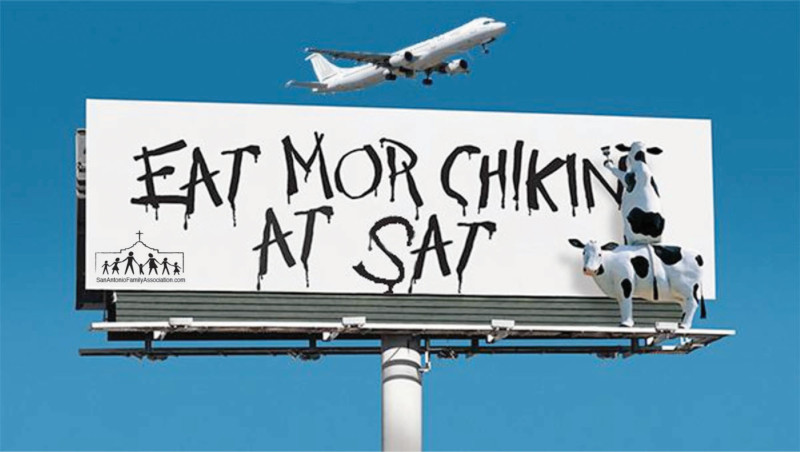The City of San Antonio has been sued by five local residents over its decision to ban Chick-fil-A from the San Antonio airport. The lawsuit was filed on Thursday under the new law that Governor Greg Abbott signed, which took effect on September 1, 2019. Under this law, SB 1978, popularly known as the “Save Chick-fil-A” law, citizens may sue a governmental entity that takes “adverse action” against someone based wholly or partly on their donations to a religious organization. The lawsuit accuses San Antonio of discriminating against Chick-fil-A because of its support for Christian organizations such as the Salvation Army and the Fellowship of Christian Athletes.
Each of the five plaintiffs—Patrick Von Dohlen, Brian Greco, Jason Khattar, Michael Knuffke and Daniel Petri—is seeking declaratory and injunctive relief as well as court costs and attorney’s fees. The lawsuit asks the Court to enjoin the city from allowing any vendor other than Chick-fil-A to operate in the space that had been reserved for Chick-fil-A in the original concession agreement between the city and Paradies Lagardère. It also seeks an injunction that would order the city and Paradies Lagardère to install a Chick-fil-A restaurant in the 985-square-foot space across from Gate A6, consistent with the original proposal from Paradies Lagardère.
“Any vendor that attempts to occupy this space should be on notice,” says plaintiff Patrick Von Dohlen. “The city’s efforts to replace Chick-fil-A violate state law and we are suing to stop this from happening. Any vendor that tries to replace Chick-fil-A could soon be facing an injunction that prevents them from operating.”
At a city council meeting on March 21, 2019, Councilmember Roberto C. Treviño announced that he wanted Chick-fil-A banned from the San Antonio airport because “the LGBTQ community” has “come together to voice its disapproval” of the popular restaurant chain. Later in the meeting, Councilmember Manny Pelaez stated that he wanted Chick-fil-A banned from the airport because it “has been funding anti-LGBTQ organizations” and because some people regard the restaurant as “a symbol of hate.” The city council voted 6 – 4 with one abstention in favor of banning Chick-fil-A from the concessions contract. Efforts to take a revote on the issue failed 6 – 5 in council chambers on April 18, 2019.
“It is irresponsible and unacceptable for the city council to discriminate against a beloved restaurant with a stellar customer service and employee record and deny air travelers an opportunity to practice their freedom of choice,” notes Von Dohlen. “We feel a duty to speak up as patrons who have been denied the right to buy Chick-fil-A products at a public facility. Clearly, the city has violated the fundamental conscience rights of the business owners.”
“According to our city council,” says Michael Knuffke, “strongly held Christian principles mean you can’t conduct business in our city’s airport. Perhaps soon they will decide those who adopt traditional values should not be allowed to conduct business in our city at all. We need to ensure that doesn’t happen.”
Knuffke questions whether a Muslim-owned business would have been dropped from the contract.
After the San Antonio city council voted to ban Chick-fil-A from its airport, others have made similar efforts to retaliate against the restaurant chain over its support for Christian organizations. The Niagara Frontier Transportation Authority (NFTA) excluded Chick-fil-A from the Buffalo Niagara Airport at the end of March. Most recently, faculty at the University of Kansas asked administrators not to renew their contracts with Chick-fil-A.
“If the city council was thinking residents would forget about the ban, they’re wrong. Their overreach is illegal. We’re not willing to stand on the sidelines,” says Brian Greco.
The plaintiffs have launched a Go Fund Me page (https://www.gofundme.com/religious-liberty-for-chickfila) to support their legal battle. The San Antonio Family Association (SAFA), a local pro-family group, is serving as the organizational arm for the plaintiffs and will continue its work to educate through public discussions and debates in response to the city council vote.
“The city’s ban is designed to bully Christian businesses into government mandated compliance,” says Jason Khattar. “But we believe the faith communities will come out in a big way to support religious liberty.”
Daniel Petri adds that the ban results in numerous financial negatives for local taxpayers with nationwide ramifications. Still, he is optimistic about the outcome. “We’re looking forward to our day in court,” he says. “Justice will prevail.”





